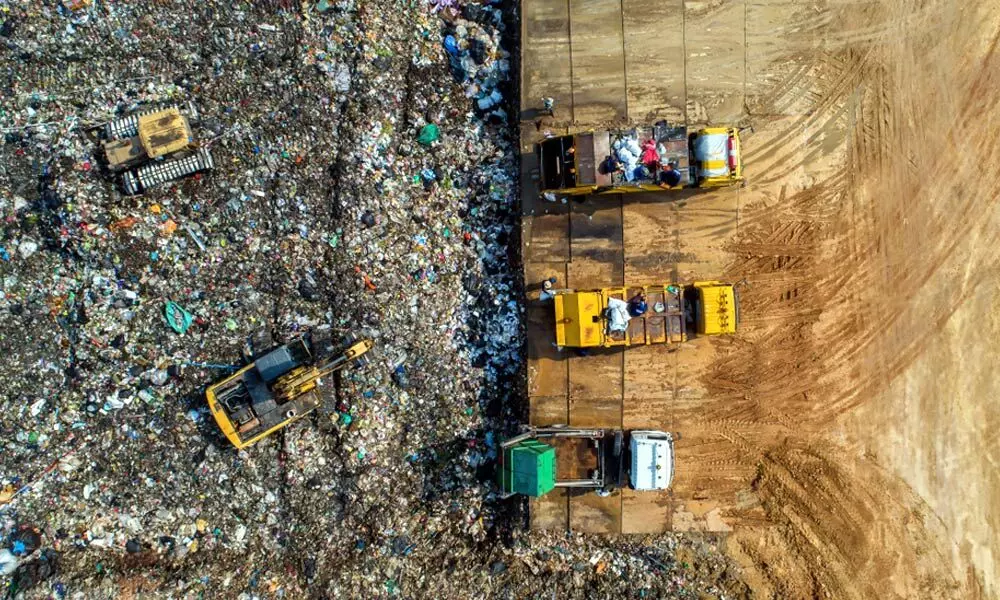Shifting to circular economy key in achieving Paris goals
By designing out waste, avoiding pollution and keeping materials in use as long as possible, we can reduce climate emissions by about 20%
image for illustrative purpose

In the virtual sessions, leaders from government, business and civil society from all corners of our planet are committed to bold action, scale up their commitments, and share best practices for a just transition to a circular economy
The WCEF+Climate's virtual conference was jointly organised by the Netherlands and the Finnish Innovation Fund Sitra. Among the attendees were ministers from dozens of countries, high level UN representatives and representatives of large companies and start-ups. "We must decouple economic growth from climate emissions and overconsumption. We need global collaboration, on the path towards autumn and the World Circular Economy Forum 2021 in Toronto, as well as UN's Climate Change Conference COP26 in Glasgow, as parts of a circular transition towards a low carbon, climate proof economy," said Jyrki Katainen, President of The Finnish Innovation Fund Sitra.
The Netherlands and The Finnish Innovation Fund Sitra welcomed representatives of governments, international organisations, knowledge institutes, the private sector, and citizens from around the globe to our virtual conference platform, The agenda to digitally meet up and discuss the crucial role of a circular economy in achieving climate neutrality.
Climate change is one of the greatest challenges of our times. A circular economy can play an important role in addressing this crisis. By designing out waste, avoiding pollution and keeping materials in use as long as possible, we can reduce climate emissions by about 20 per cent. To achieve climate neutrality, we need to look beyond energy efficiency, and all work towards a circular shift across the world.
In WCEF+Climate's virtual sessions, leaders from government, business and civil society from all corners of our planet are committed to bold action, scale up their commitments, and share best practices for a just transition to a circular economy.
WCEF+Climate is the opportunity to join other leaders in paving the way for bold steps towards a circular economy by 2050, a necessity for climate neutrality.
The Dutch Minister for the Environment, Stientje van Veldhoven, welcomed delegates to the WCEF+Climate virtual conference platform.
Addressing delegates, she said, There's a 65 per cent chance that you're watching this video message on your mobile phone.
Today we're using nearly 5 billion mobile phones all together worldwide. And for each one of them we need rare and precious resources to assemble. The pace in which we are producing, using and wasting our products requires three planets.
And we may have had a successful landing on Mars, but that doesn't make for three planets. So we have a great challenge and we've known this for a while.
And we also know that a transition to a circular economy can result in 20 per cent decrease in greenhouse gas emissions. Aiming for a circular economy by 2050 is a necessity for climate neutrality. Only Together we can build the chain to a circular economy, a necessity for climate neutrality by 2050. Collaboration is the key. It's time for a major change. It's time for new ideas.
Several commitments to achieve a worldwide circular economy were made on the two-day high-level World Circular Economy Forum + Climate (WCEF+Climate). The Netherlands Minister for the Environment, Stientje van Veldhoven, said, "With this summit, we ensured that circularity is seen worldwide as an inextricable part of solving the climate crisis."
The WCEF+Climate clearly demonstrated the worldwide efforts towards a circular economy to reach our climate targets. Without a circular economy, it is difficult to achieve the goals of the Paris Agreement. The smarter use of raw materials, greater reuse of goods and better recycling could account for a 20 percent reduction in CO2 emissions worldwide.
The We Are Tomorrow Global Partnership, a worldwide youth movement, played an important role at the conference. The Dutch youth climate movement got a seat at the table: they will be involved in policy discussions towards a circular economy in the Netherlands. Chairman Werner Schouten: "We are pleased that young people's voice worldwide is becoming increasingly important. And in the Netherlands, we see that thousands of young people want to make an active contribution to a circular economy. The fact that we are allowed to participate in discussions with other stakeholders is another important step forward."
Representatives of the United Nations included Amina Mohammed (Deputy Secretary-General), Inger Andersen (Executive Director UNEP) and Achim Steiner (Administrator, UNDP). Among the European Commission's representatives was Frans Timmermans (Executive Vice-President). In more than 20 sessions, dozens of countries and companies pledged to work closer to increase the impact of existing circular initiatives.

